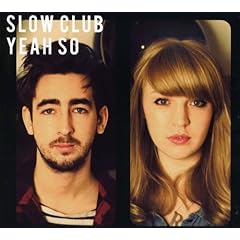
Musical compartmentalisation is of course a bad thing more often than not, but it’s increasingly an exercise in chasing one’s own tail trying to work out where Slow Club fit in. They’re not really twee, or indie, or folk, or anti-folk, or acoustic roots, but you can see how the confusion might have arisen. Charles Watson and Rebecca Taylor’s harmonies and summery faux-ramshackle approach is one that doesn’t reach out for approval or, despite the album title, smug superiority but suggests in an implicit, low-key fashion that people discover them under their own steam. Which, with more than a couple of years’ worth of singles and well placed support slots behind them, seems to be working out fine. The sound of Yeah, So? bears that gameplan out. Although the sound the pair make often clatters its way through in its enthralled excitement it never over-reaches itself. There seems a lot going on amid the gang shouts and unorthodox percussion but listen closer and it turns out everything has its place without resorting to overcrowding, playing off each other intuitively with a deceptively basiuc, charmly captivating nature.
While comparisons between a male/female duo and the White Stripes are logically uncalled for, opener When I Go has their acoustic moments on White Blood Cells (think We’re Going To Be Friends) in the simplicity of the guitar structure and direct sentiments, while there’s also a certain resemblance to the Everly Brothers in the simple vocal harmonies and country inflected guitar vibrato. Throughout there’s the sense that Slow Club are less a project based on a long term gameplan and more an opportunity for two friends to have fun while writing songs built on genuine emotion and human connection. Because We’re Dead runs on a rockabilly/skiffle shuffle that often seems to be hanging on for dear life but succeeds through broad joyfulness. Giving Up On Love and Trophy Room borrow the celebrated Johnny Cash rhythm and turns it towards the jangly dark side, while It Doesn’t Have To Be Beautiful hides tear-stained lyrical matter to a frenetic shifting country-punk hoedown a la latter day Mekons, providing in its coda the first of only two appearances of the massed overdub vocal army that’s showed up on a couple of their previous singles. They can more than adequately do fragile balladry too. While titles like There Is No Good Way To Say I’m Leaving You aren’t leaving a lot to the imagination, they’re where the sparse set-up and direct feelings expressiveness heighten the bruised emotions. In taking time over their craft they’ve clearly learnt when to let go and when to keep that desire as contained away from sappiness as possible. Come On Youth shimmers and builds towards a clarion call for the hopeful, while I Was Unconscious, It Was A Dream introduces a distorted electric guitar that somehow manages not to disrupt the tambourine rhythm and harmonies. It's not sadness in the wantonly lachrymose sense of most broken heart exhumers - see Charles' solo Dance ‘Til The Morning Light, reflective and raw like early Bright Eyes. But for all that, Slow Club’s strength is that they sound spontaneous and celebratory about the act of being able to make music itself, a lightness of touch and sweetness of mood even when the lyrics don’t seem to demand it. They know exactly what they are, and even when they don’t want to be all-out acoustic rock’n'roll they’re pleasingly enthusiastic and naturally infectious enough for it not to matter.
This is an edited version of a review that originally appeared on The Line Of Best Fit
It Doesn't Have To Be Beautiful
The full list
No comments:
Post a Comment